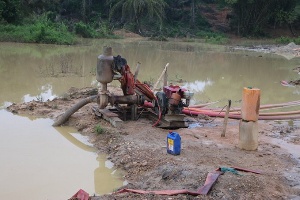As someone who spent four years at the Kwame Nkrumah University of Science and Technology’s College of Agriculture and Natural Resources studying for a degree in Natural Resources Management, my heart bleeds anytime I hear and read stories about the destruction of our rivers and water bodies through illegal mining popularly called galamsey. Last year, as I watched Poisoned for Gold, a Joy News documentary on illegal mining produced by Erastus Asare Donkor, I concluded
that we are a failed nation because of our inability to protect our water bodies.
That documentary revealed how ten major rivers across the country including the Oda, Ankobra, Tano, and Offin, among others, are now laden with high levels of dangerous heavy metals like lead, arsenic, chromium, and cadmium, among others.
Galamsey operations frequently use these harmful chemicals as well as mercury and cyanide to extract gold. These chemicals are often discharged into nearby rivers and streams, contaminating water bodies. These are chemicals that should never have found their way into our water bodies in the first place. Take lead for example. It is such a dangerous chemical that in the USA, the Environmental Protection Agency has warned that exposure to lead, even in small amounts, can lead to serious health issues in children, including behavioural and learning problems, reduced IQ, hyperactivity, slowed growth, hearing loss, anaemia, seizures, coma, and in severe cases, death.
According to the EPA, lead can accumulate in the body over time and is stored in bones alongside calcium. During pregnancy, this stored lead can be released from the mother's bones and transferred to the fetus or breastfeeding infant, posing risks to the baby's developing brain, kidneys, and nervous system. Lead exposure also affects adults, potentially causing cardiovascular problems, increased blood pressure, hypertension, and reduced kidney function. You can read more about it here; https://www.epa.gov/lead/learn-about-lead.
Sadly, it is just one of the several dangerous chemicals that are found in the water bodies that serve as sources of fish and drinking water in our
homes. This puts all of us at risk. Beyond the pollution of our water bodies, these illegal miners continue to destroy our forests. Just last week, I watched on Joy News as another investigative report that revealed the encroachment of
Ghana’s protected forest reserves in the Asankragua and Aowin municipalities of the Western Region. This invasion has resulted in the destruction of an area of biodiversity equivalent to over 10 football fields. The pictures are scary. In 2022, Ghana experienced a significant loss of 18,000 hectares of primary forest, marking a nearly 70% increase compared to 2021, according to a report by Global Forest Watch.
This represents the largest surge in forest loss reported by any country in
recent years. The consequences of the destruction of these forests and others could be transgenerational. When I studied at KNUST, we learned about how forests are vital to the global climate system primarily because of their role in protecting the environment from climate change. They act as natural carbon sinks, meaning they absorb and store carbon dioxide (CO2) from the atmosphere.
This process helps to regulate the amount of CO2 in the air, which is essential for controlling global temperatures and mitigating climate change. Trees and other plants absorb CO2 during photosynthesis, a process where they convert sunlight into energy and produce oxygen.
This CO2 is then stored in the trees’ biomass (trunks, branches, leaves) and the soil as organic matter. This makes forest soils rich in organic matter. When leaves, branches, and other plant materials decompose, they contribute to the soil's carbon content and increase the fertility of soils for agricultural production. Healthy forests have extensive root systems that also help sequester carbon in the soil. Mature forests also store carbon over long periods. Old-growth forests, in particular, hold large amounts of carbon due to their extensive biomass and accumulated organic matter in the soil.
When forests are cleared for activities like mining, the carbon stored in trees and soil is released back into the atmosphere. This sudden release of CO2 contributes to increased atmospheric carbon levels, exacerbating global warming. The removal of trees and vegetation means that there are fewer plants to absorb CO2 from the atmosphere. This reduction in the forest's carbon absorption
capacity leads to higher levels of CO2, which accelerates the greenhouse effect and contributes to climate change.
Deforestation can also disrupt local ecosystems, affecting the balance between carbon sequestration and carbon release. For example, degraded soils may lose their ability to store carbon effectively and altered forest structures can change the dynamics of carbon cycling. The loss of forests can create
feedback loops that further exacerbate climate change. For example, increased atmospheric CO2 can lead to more severe weather events, which can, in turn, lead to more forest loss.
Forests are critical in regulating atmospheric CO2 levels through carbon sequestration. Deforestation, particularly for activities like illegal mining, diminishes this capacity and contributes significantly to climate change
by increasing the concentration of greenhouse gases in the atmosphere. Protecting and restoring forests is therefore essential for maintaining global climate stability and mitigating the impacts of climate change.
Recently the Minister for Food and Agriculture announced that almost 1 million farmers have lost their crops due to drought situations brought on by climate change. Destroying our forests will only worsen the challenge of climate change and make our nation even more food insecure. That is why we all need to take an interest in helping combat the illegal mining menace. It is a danger to us all.
Galamsey may provide short-term economic benefits to individuals and communities but its long-term impacts on the environment and society are profoundly detrimental. It is harmful to the society at large. Addressing this issue requires a multifaceted approach that includes stricter enforcement of mining regulations, community engagement, and the promotion of alternative livelihoods to reduce dependence on illegal mining activities.
Continued illegal mining leads to widespread environmental destruction, including deforestation, soil erosion, and water contamination. This degradation not only affects ecosystems but also undermines the natural services that forests and water bodies provide, such as clean air, fertile soil, and climate regulation. We must act decisively as a nation to safeguard our environment and secure a sustainable future for our people. The health of our natural resources, including water bodies and forests, is integral to our well-being and prosperity. If we fail to protect these vital resources from the ravages of illegal mining, we risk undermining our future and compromising our national
integrity. Investing in sustainable development and environmental protection not only preserves our natural resources but also ensures a resilient and thriving future for all.
Opinions of Tuesday, 17 September 2024
Columnist: Bernard Acquah-Aubyn



















